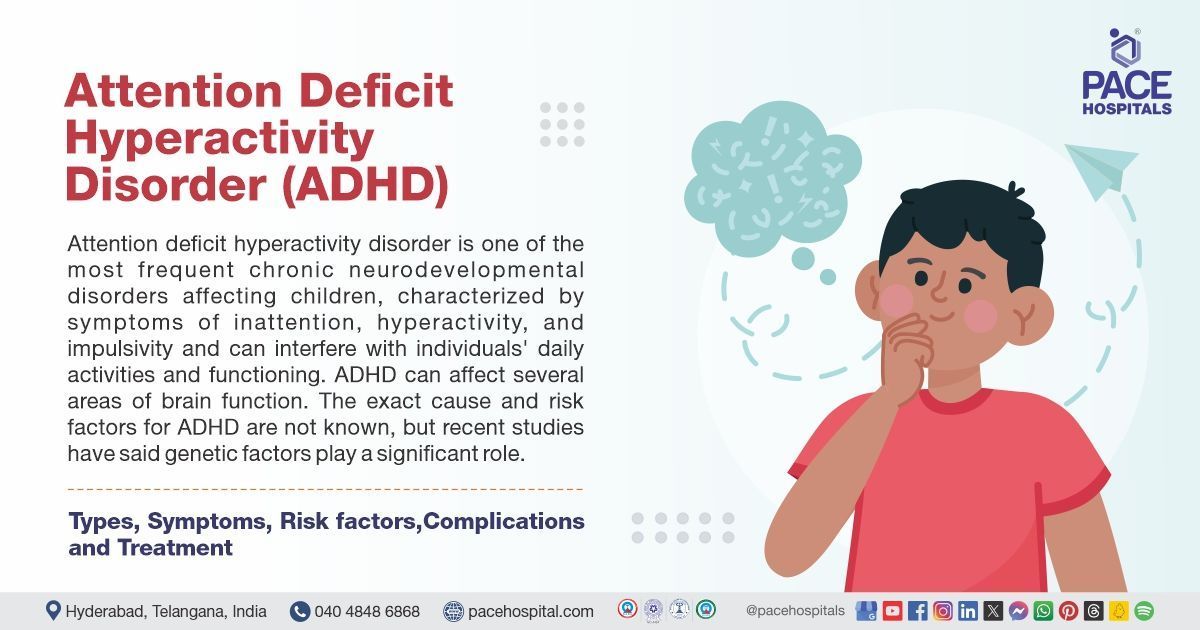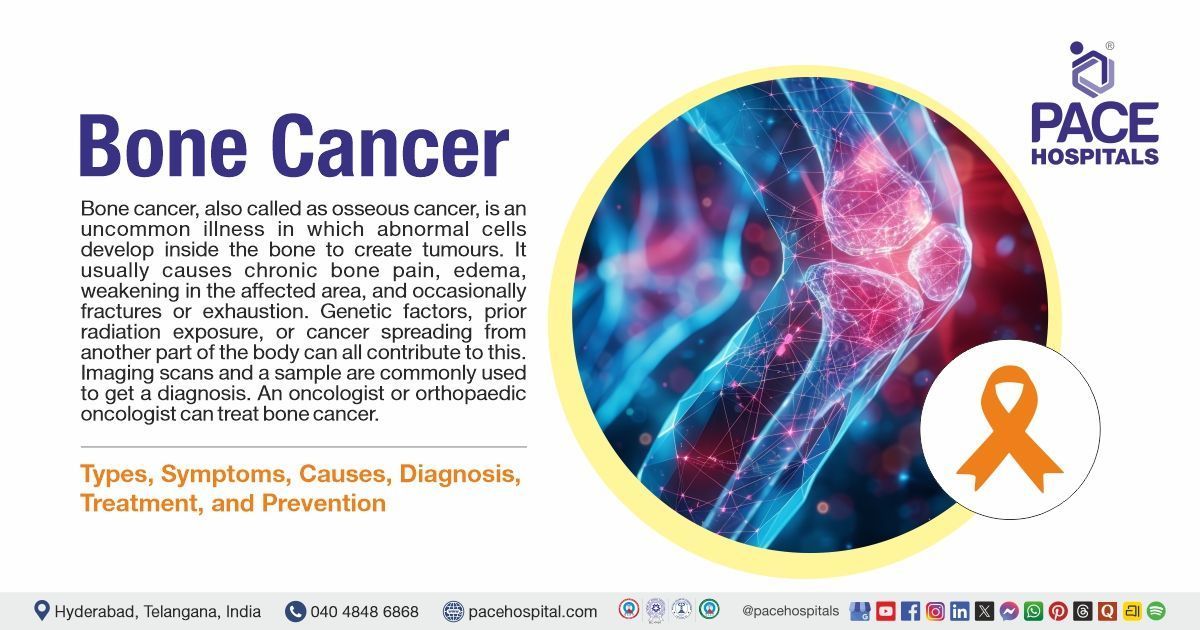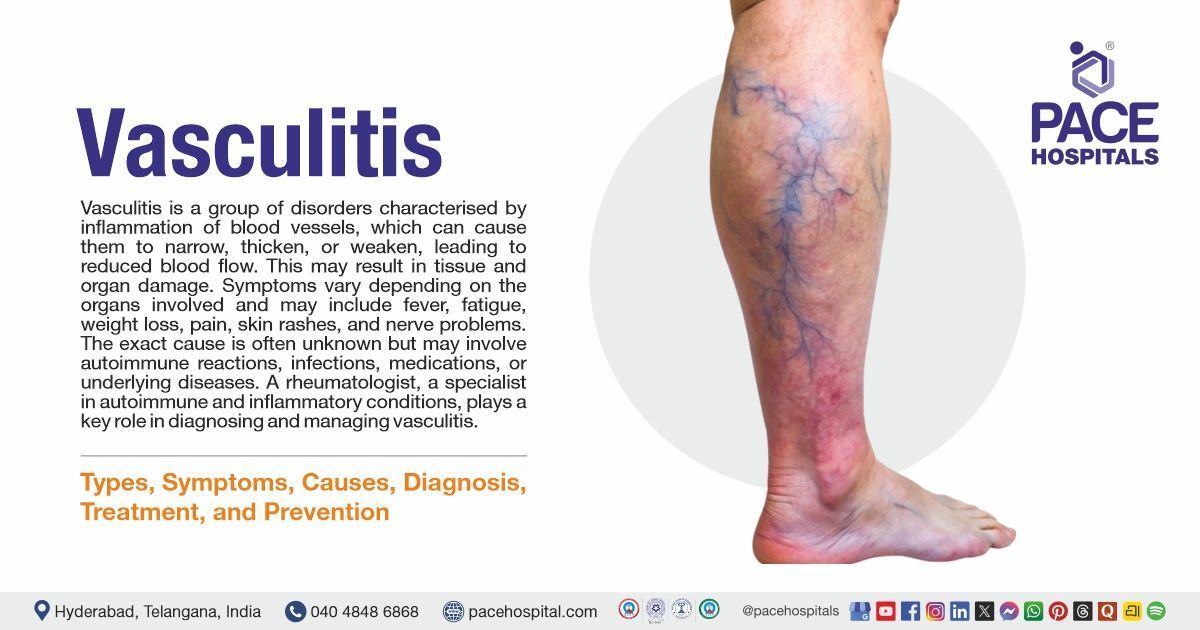ADHD - Symptoms, Types, Causes, Complications, and Treatment
PACE Hospitals
Overview | Prevalence | Types | Causes | Symptoms | Risk Factors | Complications | Diagnosis | Treatment | Prevention | Adhd vs Autism | FAQs | When to consult a Doctor
ADHD full form
ADHD stands for attention deficit hyperactivity disorder.
ADHD definition
Attention deficit hyperactivity disorder (ADHD) is one of the most frequent chronic neurodevelopmental disorders affecting children, characterized by symptoms of inattention (unable to focus), hyperactivity (having increased movement), and impulsivity (reduced behavioural control) and can interfere with individuals' daily activities and functioning. ADHD is usually first diagnosed in childhood, and in many cases, it lasts into adulthood. ADHD was previously termed as attention deficit disorder (A DD). ADHD can affect several areas of brain function . The exact cause and risk factors for attention deficit hyperactivity disorder (ADHD) are not known, but recent studies have described that genetic factors play a significant role. Various qualified healthcare professionals, including paediatricians, psychologists, or psychiatrists with specialized knowledge and skills in the treatment and care of attention deficit hyperactivity disorder (ADHD), can effectively handle ADHD patients.
ADHD Prevalence
Prevalence of ADHD in the world
According to one study published in the Journal of Global Health in the year 2021, the prevalence of persistent adult ADHD (with a childhood-onset) and symptomatic adult ADHD (despite a childhood-onset) both decreased with an increase in age. The prevalence of symptomatic adult ADHD was 6.76% (36.633 crores), and the prevalence of persistent adult ADHD was 2.58% (13.984 crores) in the year 2020 globally. According to another study conducted in 2023, the prevalence of ADHD in children aged 3-12 years was 7.6%, and the prevalence of ADHD in adolescents aged 12-18 years was 5.6 %.
Prevalence of ADHD in India
According to a 2013 study in the Indian Journal of Psychiatry, the prevalence of ADHD among primary school children was 11.32%. The prevalence was greater in men (66.7%) compared to women (33.3%). The prevalence was higher in the nine—and ten-year-old age groups.

Types of ADHD
Depending on the type of symptoms present in the individuals, attention deficit hyperactivity disorder (ADHD) is mainly of three types. It includes the following:
- ADHD, inattentive and distractable: Inattentive means having difficulty staying focused, organized, or on task. People with this type of ADHD may get distracted easily and may become inattentive. It becomes challenging for individuals to pay attention to the details or to follow the instructions.
- ADHD, impulsive/hyperactive: This is the least common ADHD type, and individuals have symptoms of both impulsivity and hyperactivity. Impulsivity means a tendency to act (make decisions) without thinking. Hyperactivity refers to excessive (increased) movements such as fidgeting (to move or act restlessly or nervously), being talkative, and excessive energy usage. People with this type of ADHD may not have difficulty paying attention. Individuals with impulsiveness may suffer more accidents and injuries than others.
- ADHD, combined: Individuals with this most common type of ADHD are both hyperactive and impulsive, are easily distracted, and may also have trouble paying attention
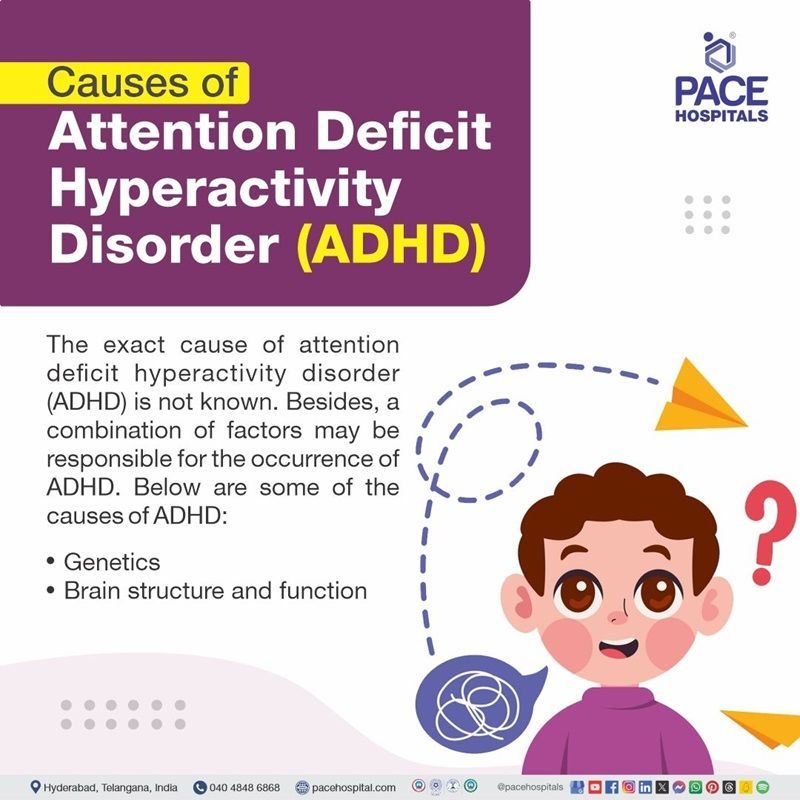
What Causes ADHD
The exact cause of attention deficit hyperactivity disorder (ADHD) is not known. Besides, a combination of factors may be responsible for the occurrence of ADHD. Below are some of the causes of ADHD:
- Genetics: Recent studies showed that genetics are essential in causing ADHD. Several genes have been linked to ADHD, but no specific gene has been recognized as the exact cause of attention deficit hyperactivity disorder .
- Brain structure and function: Some of the studies that involved brain scans suggested that some areas of the brain may be smaller in ADHD people while other regions may be more significant. Other studies indicated that an imbalance in the neurotransmitter levels in the brain may arise in individuals with ADHD.
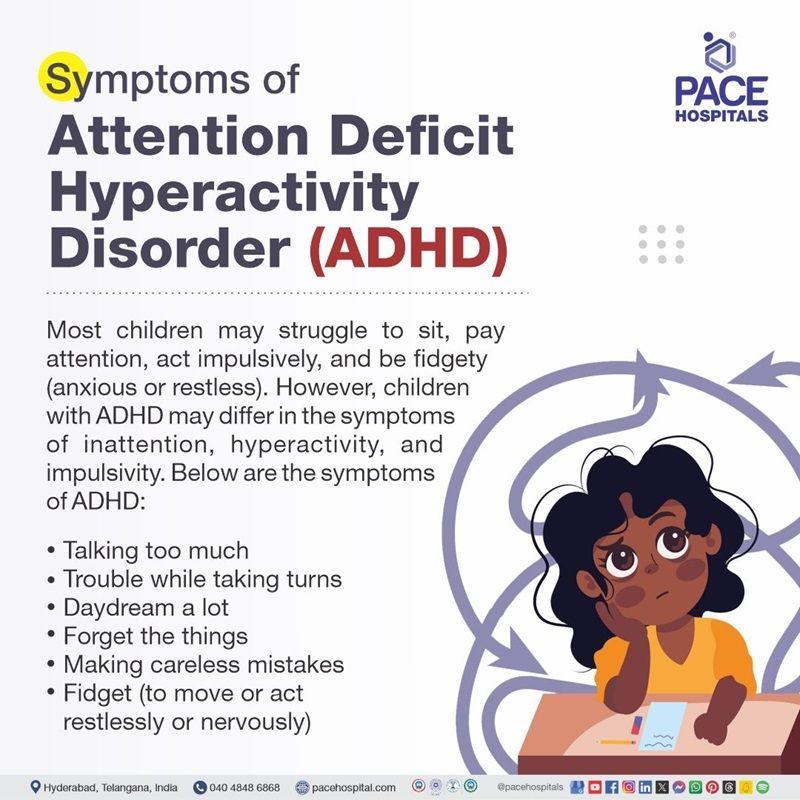
ADHD Symptoms
Most children may struggle to sit, pay attention, act impulsively, and be fidgety (anxious or restless). However, children with ADHD may differ in the symptoms of inattention, hyperactivity, and impulsivity. Below are the symptoms of ADHD:
ADHD symptoms in children
- Talking too much
- Trouble while taking turns
- Daydreaming a lot
- Forgetting the things
- Making careless mistakes and taking unnecessary risks
- Fidget (to move or act restlessly or nervously)
- Difficulty in resisting temptation
Inattentive ADHD symptoms
- The patient seems to be somewhere and does not listen when spoken to.
- Patients may not follow instructions and cannot complete the assigned tasks (they may start the task but soon lose the focus)
- Some tasks, such as completing forms and preparing reports, which require sustained mental effort, may be disliked by ADHD patients.
- People may not pay attention and make careless mistakes in school or their daily jobs.
- During conversations, lectures, or extended reading, people may find it hard to stay focused on tasks or activities.
- People may often lose things in daily life, such as cell phones, eyeglasses, car keys, books, and wallets.
- People may need to remember their daily tasks and may not pay bills at the appropriate time.
- Easily gets distracted.
- People may need help organizing daily tasks.
Hyperactive/ impulsive ADHD symptoms
- Patients talk too much.
- Patients may not be able to play quietly.
- Patients may be unable to stay seated in the workplace or classroom.
- Patients may run or climb in inappropriate situations.
- Patients may face difficulty while waiting in line.
- Patients may interrupt others (cut into the conversations or games)
- Patients may fidget (to move or act restlessly or nervously).
- Patients may blurt (say suddenly without thinking) out answers instead of waiting for the question to complete.
Combined ADHD symptoms
People have a mixture of symptoms of both hyperactive/impulsive ADHD and inattentive ADHD.
Risk Factors of ADHD
Although the exact reason for ADHD is not known, some factors may increase the occurrence of ADHD. Below are some of the known risk factors of attention-deficit/hyperactivity disorder (ADHD):
- Brain injury: Mild traumatic brain injury (m TBI) is an independent risk factor for attention deficit hyperactivity disorder (ADHD)
- Epilepsy: Since the 1950s, attention deficit hyperactivity disorder (ADHD) has been linked to epilepsy disease.
- Alcohol and tobacco use during pregnancy: According to a study in Psychiatry Res journal, the results revealed that because of alcohol exposure and smoking, the risk of ADHD is significantly increased.
- Premature delivery: Studies have revealed that premature delivery (before the 37th week of pregnancy) has been linked to an increased risk of attention deficit hyperactivity disorder (ADHD) .
- Low birth weight: According to a study of J child Psychol psychiatry, low birth weight is indirectly associated with the severity of ADHD.
- Exposure to environmental risks (e.g., lead) at a young age or during pregnancy: Prenatal exposure to toxic metals (like lead) during pregnancy may be a risk factor for attention deficit hyperactivity disorder (ADHD)
- Iron deficiency: According to the Indian Journal of Psychiatry, some studies have revealed that iron deficiency anaemia makes one 3.82 times more prone to ADHD.
Nutrition, obstructive sleep apnea, home environment, extreme stress during pregnancy, and early childhood trauma are some of the other risk factors for attention deficit hyperactivity disorder (ADHD).
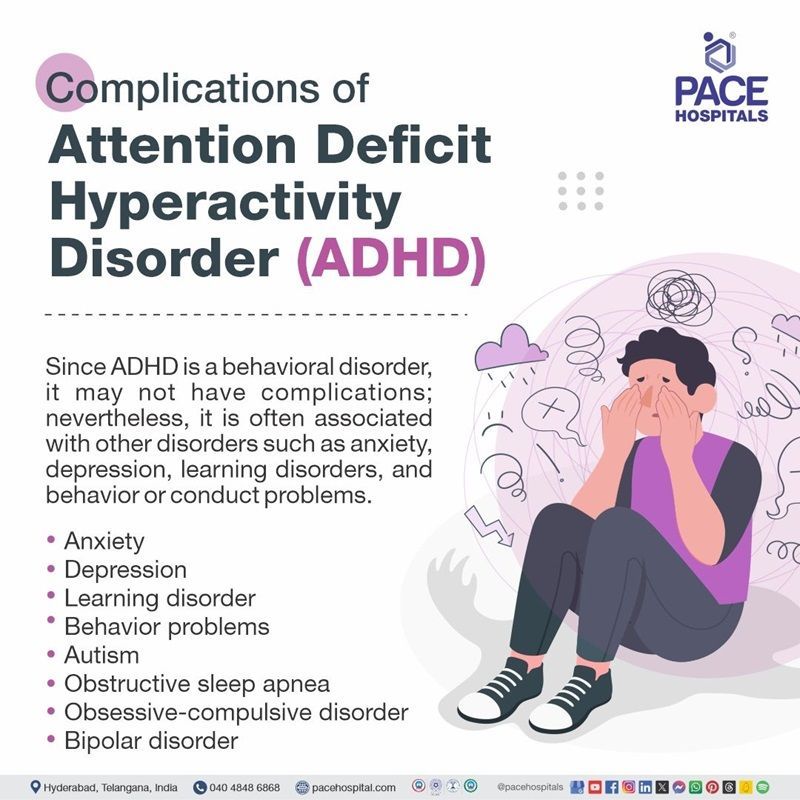
ADHD Complications
Since ADHD is a behavioral disorder, it may not have complications; nevertheless, it is often associated with other disorders such as anxiety, depression, learning disorders, and behavior or conduct problems.
- Anxiety: Children with attention deficit hyperactivity disorder (ADHD) are more likely to get anxiety disorder than other children.
- Depression: Children with ADHD are more likely to feel sad and hopeless when they cannot control the symptoms of ADHD.
- Learning disorder: Many children with attention deficit hyperactivity disorder (ADHD) suffer from learning disorders and face difficulty in school.
- Behavior problems: Many children with attention deficit hyperactivity disorder (ADHD) are more likely to develop behavior disorders than others.
- Autism: It is also known as autism spectrum disorder (ASD). Individuals with autism may have challenges with communication and social skills.
- Obstructive sleep apnea: Blockage of the airway during sleep may occur more frequently in people with attention deficit hyperactivity disorder (ADHD).
- Obsessive-compulsive disorder (OCD): It is a condition that causes obsessive thoughts and compulsive behavior.
- Bipolar disorder: It is a condition affecting an individual's mood and can swing from one extreme to another.
ADHD Diagnosis
No single test can diagnose ADHD. Diagnosis of attention deficit hyperactivity disorder (ADHD) is a clinical and multi-step process based on thorough medical, educational, developmental, and psychological evaluations . The diagnosis of attention deficit hyperactivity disorder (ADHD) in children and adults depends on the following criteria.
- Medical assessment: History of prenatal (before birth) exposures, perinatal (the period when you become pregnant and up to a year after giving birth) complications and family history of ADHD.
- Electroencephalography (EEG): Nevertheless, it is not routinely recommended.
- Neuroimaging: Magnetic resonance imaging (MRI) scan.
- Developmental assessment: ADHD-specific rating scales (such as the Vanderbilt Assessment Scale, the ADHD Rating Scale-V), and the Conners Comprehensive Behavior Rating Scale)
- Educational assessment: Rating scales and checklists
Diagnosis in children and teenagers
- To be diagnosed with ADHD, the child must have six or more symptoms of inattentiveness, impulsiveness, and hyperactivity.
- Child must start to show symptoms before 12 years of age.
- If the child has been showing continuous symptoms for at least six months.
- Child must show symptoms that make their lives more difficult socially, academically, or occupationally.
Adult ADHD diagnosis
- To be diagnosed with ADHD, an adult must have five or more symptoms of inattentiveness, impulsiveness, and hyperactivity.
- Symptoms must have been present since childhood.
ADHD Treatment
The treatment of attention deficit hyperactivity disorder (ADHD) depends on the severity of the condition. There are many treatment options available for ADHD, which helps in managing the symptoms in everyday life. It includes the following therapies:
Pharmacological therapy
Stimulants (Norepinephrine and dopamine reuptake inhibitors) and non-stimulants (Apha2 adrenergic receptor agonists, selective noradrenaline reuptake inhibitor)
Nonpharmacological therapy
- Psychosocial treatment: Psychoeducation for the family and patient
- Cognitive-behavioral training programs : Behavioral therapies for the patient and family members.
- Physiological treatment: Physical activity
- Mind-body intervention: Meditation, yoga and tai chi, mindfulness, hypnotherapy
- Social skills training
Diet and supplements are the other possible treatments that help in managing the symptoms of attention deficit hyperactivity disorder (ADHD)
Why Choose PACE Hospitals?
Expert Super Specialist Doctors
Advanced Diagnostics & Treatment
Affordable & Transparent Care
24x7 Emergency & ICU Support
ADHD Prevention
Yet, there are no known preventive measures for attention deficit hyperactivity disorder (ADHD). Still, symptoms of ADHD can be managed by following some of the measures in addition to the behavioral and pharmacological treatment.
- Mindfulness meditation has been shown to improve self-control and attention.
- Following strict daily physical activity based on the individual’s age.
- Consuming a proper diet that includes vegetables, plenty of fruits, lean protein sources, and whole grains.
- Getting the recommended amount of sleep every day based on the individual's age.
- Limiting the amount of daily screen time from electronic gadgets such as mobile phones, computers, and TVs.
Difference between ADHD and autism (difference between ASD & ADHD)
adhd vs autism
Though the symptoms of ADHD and autism neurodevelopmental disorders may be similar, the two are distinct conditions. The following parameters can differentiate ADHD and autism:
| Parameters | ADHD | Autism |
|---|---|---|
| Definition | Attention deficit hyperactivity disorder (ADHD) is one of the very frequent chronic neurodevelopmental disorders affecting children, characterized by symptoms of inattention (unable to focus), hyperactivity (having increased movement), and impulsivity (reduced behavioural control) and can interfere with individuals' daily activities and functioning. | Autism, also known as autism spectrum disorder (ASD), is a developmental disability that affects how people interact with others, communicate, learn, an d behave |
| Symptoms | Talking too much, having trouble while taking turns, daydreaming a lot, forgetting things, making careless mistakes and taking unnecessary risks, fidgeting (moving or acting restlessly or nervously), and having difficulty resisting temptation. | Delayed speech and understanding of speech, lack of eye contact while speaking, lack of social and emotional factors, difficulty in developing and maintaining relations |
| Cause | The exact cause of attention deficit hyperactivity disorder (ADHD) is not known. Recent studies suggested that genetic brain structure and function may cause ADHD. | The exact cause of autism is unknown. Recent studies suggested that genetics and environmental factors may cause autism. |
| Treatment | The treatment of attention deficit hyperactivity disorder (ADHD) depends on the severity of the condition. It includes both pharmacological and nonpharmacological therapy. | There is no standard treatment for autism, but there are many ways to manage the symptoms. It includes medication, behavioral, and educational therapies. |
Frequently Asked Questions (FAQs) on ADHD
Can ADHD be cured?
Though there is no cure for attention deficit hyperactivity disorder (ADHD), its symptoms can be managed by available treatment options such as medications, cognitive and behavioral training programs, meditation, yoga, mindfulness tai chi, and hypnotherapy.
Is ADHD a disability?
Attention deficit hyperactivity disorder (ADHD) is considered a dysfunction of executive functioning, mainly the activity of the frontal lobe. Hence, patients with ADHD show disability not only in focus and attention but also in emotional regulation and decision-making
Is ADHD genetic?
Recent studies showed that genetics play an essential role in causing ADHD . Several genes have been linked to ADHD, but no specific gene has been recognized as the exact cause of attention-deficit/hyperactivity disorder .
Does ADHD get better with age?
Yes, ADHD may be improved with age. Early diagnosis and treatment of attention deficit hyperactivity disorder (ADHD) in people may be beneficial. Still, many individuals who are diagnosed with ADHD at a young age may continue to experience problems.
Is ADHD a disease or disorder?
Rather than a disease, attention deficit hyperactivity disorder (ADHD) is a disorder that can affect several areas of brain function. ADHD is one of the most frequent chronic neurodevelopmental disorders affecting children. It was previously termed as attention deficit disorder (ADD).
What is ADHD?
Attention deficit hyperactivity disorder (ADHD) is one of the very frequent chronic neurodevelopmental disorders affecting children, characterized by symptoms of inattention (unable to focus), hyperactivity (having increased movement), and impulsivity (reduced behavioral control) and can interfere with an individuals' daily activities and functioning.
Do I have an ADHD test?
There is no single test that can help to diagnose ADHD. Diagnosis of attention deficit hyperactivity disorder (ADHD) is a clinical and multi-step process based on thorough medical, educational, developmental, and psychological evaluations , and it mainly depends on the symptoms of the patient.
How to treat ADHD in adults without meds?
There are many treatment options available for ADHD. Along with pharmacological therapy (using medications), ADHD can also be treated using a nonpharmacological treatment that includes cognitive and behavioral training programs, meditation, yoga, mindfulness tai chi, and hypnotherapy.
Can meditation cure ADHD?
Meditation, either concentrative or mindfulness, has a positive impact on people with ADHD. It improves the symptoms of attention deficit hyperactivity disorder (ADHD), such as inhibitory control, executive function, impulsivity, hyperactivity, emotional management, and attention.
How do stimulants help ADHD?
Stimulants (Norepinephrine and dopamine reuptake inhibitors) block dopamine reuptake at the presynaptic and postsynaptic membranes. They are the mainstay of treatment for attention deficit hyperactivity disorder (ADHD) and are effective in 70 % of patients.
Can OCD and ADHD coexist?
Yes, obsessive-compulsive disorder (OCD) and attention deficit hyperactivity disorder (ADHD) can coexist. Both are common psychiatric disorders that are highly comorbid (coexisting) with each other. In early onset of OCD, ADHD is one of the most frequent co-occurring conditions.
What month is autism and ADHD awareness month?
April is the month of autism awareness. It progresses and reaffirms people's commitment to supporting research that responds to the needs of people on the autism spectrum. October is the month of ADHD awareness.
Whom to consult for ADHD?
Various qualified healthcare professionals, including pediatricians, psychologists, or psychiatrists with specialized knowledge and skills in the treatment and care of attention deficit hyperactivity disorder (ADHD), can effectively handle ADHD patients. People can consult them for ADHD .
Is ADHD a pervasive developmental disorder?
Yes, attention deficit hyperactivity disorder (ADHD) is a pervasive developmental disorder (PDD) characterized by severe impairment in various areas of development. The DSM-IV diagnostic criteria require PDD as an exclusive criterion for the diagnosis of ADHD.
When to consult a doctor for ADHD?
Consult a doctor for ADHD if you or your child has ongoing trouble with focus, impulsivity, or restlessness that affects daily life, school, or work. Signs that need medical attention include:
- Difficulty paying attention or finishing tasks
- Frequent forgetfulness or disorganisation
- Restlessness or trouble sitting still
- Impulsive actions that cause problems at school, work, or in relationships
- Poor time management or emotional control
- Declining performance despite consistent effort
If these symptoms continue or get worse, see an ADHD doctor or mental health professional for a proper diagnosis and treatment plan. Getting help early can make it easier to manage symptoms and improve everyday life. Seek medical help right away if you experience severe anxiety, depression, or thoughts of self-harm along with ADHD symptoms.
Share on
Request an appointment
Fill in the appointment form or call us instantly to book a confirmed appointment with our super specialist at 04048486868

